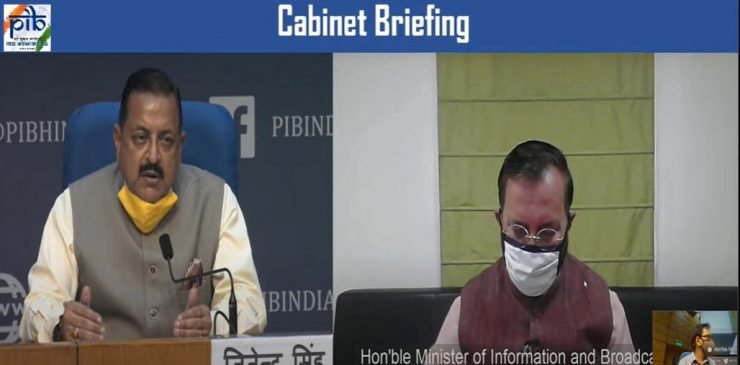
The Union Cabinet on June 24 approved that the government will allow now private sectors to use facilities and assets of Indian Space Research Organisation (ISRO) and they would be provided a level-playing field in satellite launches and space-based services. The decision taken in the Union Cabinet led by Prime Minister Narendra Modi is expected to free up India’s premier space agency ISRO to focus on research and development in this sector as well as providing opportunities to expand India’s space exploration and technology through private participation.
The media report quoted the statement of Union Minister Prakash Javadekar as “We have built up really good space assets, these assets are now opening up for everyone’s use.” Minister of State (MoS) for Department of Space Dr Jitendra Singh was quoted as saying, “Newly created Indian National Space Promotion and Authorisation Centre (IN-SPACe) to provide a level-playing field for private companies to use Indian space infrastructure. It will also hand-hold, promote and guide the private industries in space activities, PM Modi is known for taking decisions that are bold, unorthodox, and futuristic; which is why the decision for hosting the private sector participation in space sector activities has been taken. There was a history and tradition of keeping the space activities shrouded under secrecy, In the last 2-3 years, PM Modi has given a special boost to exploration of space through enhancing our launching activities and exploration of space through extra-launching activities.”

Earlier while elaborating PM Modi’s mega economic package to boost up economy during and after Covid-19 pandemic, Union Finance Minister Nirmala Sitharaman indicated this. Thus, it seems a long-pending decision of the government that has been materialised through cabinet approval. But there are certain important points and related several pros and cons to this new initiative by New Delhi that needs to be analysed in detail considering all aspects.
Minister of State (MoS) for Department of Space Dr Jitendra Singh
This is true that since the initiations of private and foreign investments as the new vistas of economic revival as was propagated in the 1990s, India has come a long way in terms of private and foreign investments in the important Public Sector Undertakings (PSUs) in the country. The new age economic doctrine was adopted in India when Dr Manmohan Singh was the Union Finance Minister and the successive regimes took forward the same policy and the process with extended agenda. This has been enhanced during the tenure of Prime Minister Modi. Today, even there is sizeable presence of the private investors in the most crucial sector of the country like defence and defence procurements of India.
However, opening India’s space-research for private investment is certainly of larger implications. These include the issues like ending or curtailing ISRO’s monopoly in India’s space research, prospect of India’s space research in the coming days, opportunities for private investors, attracting strategy to ensure involvement of private sector enterprises to invest in India’s space mission, threat perception in case of technology and data sharing, its vulnerability on India’s defence mechanism and so on. All these are important and very relevant points.
This will not be wrong to say that for the ISRO itself this is not anything unprecedented. That means to certain limit private investment has been allowed to work in collaboration with the ISRO so far. This may be said that as far as official stand of the ISRO is concerned, private sector engagement in India’s space research is not a new phenomenon. However, the limit of engagement of the private sectors after the new policy decision of Modi government will be larger in context. This is true that there have been collaboration and investment of reputed private sectors in India’s ambitious space mission. So also, the highly sophisticated space research programmes of different nations like USA’s NASA, Russia’s Institute of Kosmicheskih Issledovanyi and Israel’s Asher Space Research Institute (ASRI) all allowed private investment with some regulations to engage in their respective space programmes. This shows that India is following the footprints of large nations and the cause behind this enthusiasm is ISRO’s previous experience.
But the question is: how will government attract the private investors? This question arises because space research is not profit-making enterprise that can provide immediate return unlike the other sectors. Similarly, the cost and the amount of investment in case of failing any mission, there is nothing to compensate. After all, who will take liability to provide guarantee to the investors? Both these points are relevant for the prospect of the private investors as investment demands returns. Similarly, completion of every project will not only require huge amount but also passing the same by the government, which has been a lengthy process. All these are important issues for the private investors. Similarly, as per experience of a number of ISRO officials both present and past, the projects completed after spending huge and sending the same into the space, this remains unutilized for years.
Investment in space programme needs accessibility by others and this is related to profit gain. In fact, getting a user is never an easy task as things are not easily sellable unlike others. Accessibility of DTH and using the satellite are some case in point in this context. But things have changed substantially in recent years because of large entry of different companies to use the artificial satellite for communication, evolution of electronic media, increasing number of smart-phone users and increased use of internet service for both individual and institutional purposes. Similarly, the number of persons educated and trained in aromatic science has also increased who can really reshape India’s space research sector. At a time, when Indian technocrats are losing job in various other countries particularly in the United States, United Kingdom, EU and others, Public Private Enterprise (PPE) can also provide job opportunities to the Indian technocrats both living in India and overseas if the private sector gets a good sharing in India’s space research.
But this needs to be considered from another parameter which is related to India’s legitimate concern regarding space-technology falling in the hands of the wrong persons. Similarly, India needs to maintain international space agreements. There is also the question of both domestic and international liability regarding everything related to India’s space research programme. The issue of data sharing for country’s defence is a very sensitive issue. There is always apprehension of leakages of confidential data related to country’s security setups. ISRO has maintained this quite well so long. But will the private sectors after getting engaged into India’s space research programme display the same responsibility? After all, the issue is related to India’s security, strategic interests and international relations. Considering the issues like terrorism, existing vulnerability, India’s strategic concern; entry of private sectors in India’s space mission may prove to be risky one. Should India gamble on this? This is the most vital question. At a time when India and China seem heading towards more escalation after the killing of 20 Indian soldiers in worst ever military conflict between the two nations after 45 years, the issue of private investment in space sector exposes bottle where the ghost dwells in the real sense. Today’s reality has redefined strong and weak. Safety of data and information provide strength. The more informed is stronger. That means, in terms of protecting data and information of India, ISRO should display greater cautiousness and for the strategic safeguard of India, Union Ministry of Home and Defence must intensify vigilance. Every action should be under the radar of both these ministries and everything deserves proper screening and scanning.
However, this is also true that not only for India’s space research but also for the ambitious projects like Make in India, Start Up India and Stand Up India, New Delhi needs more investment in the country’s space programme. Question is also there that if the other countries are attaining success following the same pattern, why can’t India? Similarly, India has already allowed private sector participation in the country’s defence sector. But the main problem is: India does not have proper regulation in this field. There is urgent need for space legislation in the country. But the Bill related to this has not been tabled in the Parliament yet. Many years have passed since ISRO urged the government to pass this legislation. However, the successive governments have ignored this. Prime Minister Modi-led government is yet to consider the matter with seriousness and include the issue related to space and space research into the legal framework of the country. So, the present government must take a pro-active role in this context. So also, government should regulate the overall matter.

This will be better if ISRO opens the arena of private investment phase wise and after thoughtful consideration of all aspects initiates things. Nothing will happen overnight; particularly participation of private investors in space research of India as New Delhi is expecting. New Delhi’s approach should be wait and watch to see how things get unfolded in the days ahead. But by this time India must evolve legal regulatory framework for the issues related to space. India must ponder over how other countries have done in this context. Reality is: legislation and law enforcement to regulate space issues are need of the hour. Government must ensure this before engaging private sectors to space research. For this Modi government needs to be more pro-active and try to evolve larger political consensus. Participation of all the stakeholders in this process is must. How does government perform to recalibrate? This remains to be seen.
The writer is a Guwahati-based strategic affairs expert.








